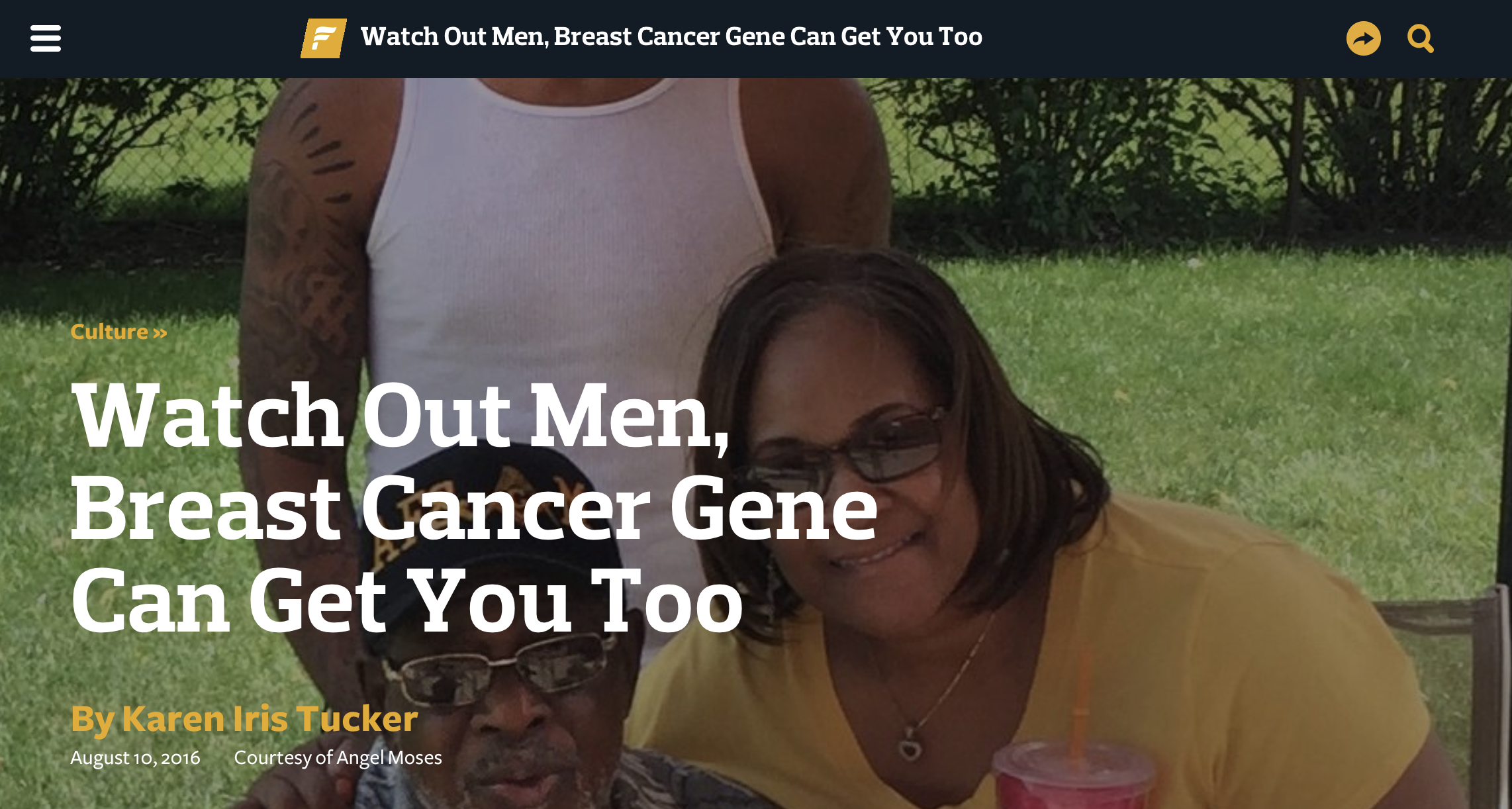by Sue Friedman
Half of all people with an inherited BRCA, ATM, CHEK2, PALB2 or other mutation associated with HBOC are men. Nevertheless, the majority of awareness, research, and resources have focused on genetic testing in women. A recent article in JAMA highlights this disparity in BRCA testing between men and women. Emerging information on the impact of mutations in men reinforces the importance of FORCE’s research, education, support and advocacy efforts to reach the male population.
According to the article by Childers, et. al., men without cancer have BRCA genetic testing at one-tenth the rate of women. However, no such disparity in testing between men and women was seen for Lynch syndrome, which increases the risk for colorectal, uterine, and ovarian cancer, among others.
HBOC, cancer risk and genetic testing in men
As in women, having a BRCA mutations can increase a man's risk for pancreatic cancer and melanoma. BRCA mutations can also increase the risk for male breast cancer, although not as greatly as for women. The mutations can be associated with an increased risk for aggressive prostate cancer. Importantly, as with women, men can pass on their inherited mutation to their sons and daughters.
Despite these known risks, very little research and resources have focused on genetic testing of men. This has led to common misperceptions about men and mutations associated with HBOC. Given the use of the words “breast and ovarian cancer” in the HBOC name, it is not surprising. There is a mistaken and dangerous belief among some health care providers and many consumers that men cannot carry, or pass on a BRCA, or other mutation in a gene associated with HBOC. Equally dangerous is the mistaken belief that men who inherit mutations do not have increased cancer risk.
Some of this misinformation may be the result of older breast cancer risk assessment models that focused only on the family history of female relatives. Additionally, the frequent association with breast cancer can overshadow the other cancer risks. Some genetic testing guidelines exclude men, making insurance reimbursement more difficult. Finally, there is more media attention on women than men with mutations. Outspoken female celebrities, such as Angelina Jolie and Christina Applegate have raised the profile of genetic testing in women and perpetuated the public perception that these gene mutations don’t affect men.
Male breast cancer
Men who carry a BRCA mutation have a higher risk for breast cancer than men in the general population. For this reason, national guidelines recommend that men with mutations undergo breast self-exam training and education and an annual clinical breast exam beginning at age 35.
All men with breast cancer meet national guidelines for genetic testing. As with women, genetic testing for men with breast cancer can help guide treatment decisions. The PARP inhibitor, Lynparza was recently approved for advanced breast cancer in people with a BRCA mutation, including men.
Some clinical trials are using PARP inhibitors and other new therapies to treat patients with hereditary breast cancer.
In a recent FORCE survey for people diagnosed with breast cancer, 18 of the 1900 respondents were men. Among these men, only 1/2 were told about the link between male breast cancer and an inherited mutation. About 1/4 said their health care provider never recommended genetic testing.

New research on genetic testing and prostate cancer
Most prostate cancers are very slow-growing and often do not pose significant risk for men. For this reason, national preventive guidelines recommend that men ages 55-69 speak with their health care provider to decide whether or not to undergo screening. These same guidelines recommend against prostate cancer screening after age 70.
Although most prostate cancers can be slow growing, some prostate cancers can be more aggressive and potentially life-threatening. Recent research shows a link between these aggressive prostate cancers and inherited mutations in BRCA1, BRCA2, ATM and CHEK2. For this reason, national guidelines recommend men with metastatic prostate cancer have genetic counseling and testing. They also recommend that men who test positive for a mutation discuss with their doctor about starting prostate cancer screening at age 45.
Men with a BRCA or other mutation who develop prostate cancer may be offered more extensive treatment sooner than patients who do not have a known mutation. Prostate cancer patients with a known mutation may qualify for participation in clinical trials of targeted therapies. Many ongoing studies are specifically designed for mutation carriers with prostate cancer, including those that are looking at the use of PARP inhibitors, which are approved for use in breast and ovarian cancer.
This research didn't come in time for my dad. By the time he was diagnosed with prostate cancer, my own father—from whom I inherited my BRCA2 mutation—already had advanced disease which ultimate took his life. That was a decade ago. Yet even now, a decade later, awareness about the hereditary link to aggressive prostate cancer remains low. FORCE volunteer, Angel Moses experienced this first-hand when her father’s oncologist dismissed this link and told them that the BRCA2 mutation in their family doesn’t affect men.
It’s important that we continue our efforts to correct misinformation and assure that all people—men and women— who are affected by hereditary cancer have access to the genetic counseling, testing, preventive and treatment services, support and information that they need to live healthy and empowered lives.
